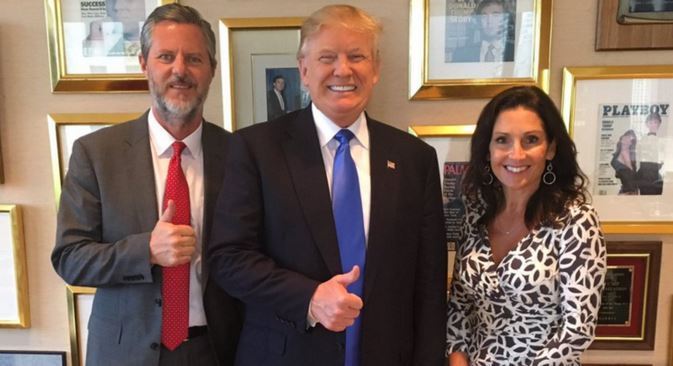
Ever since Donald Trump was caught saying the P-word, conservative evangelical leaders have been feverishly trying to distance themselves from him. It’s been particularly interesting to see blog posts by religious right leaders declaring the demise of the religious right as though they were never a part of it. Nobody wants to be labeled religious right just like nobody wants to be called a fundamentalist. It’s true that the religious right is not a theological monolith. It includes Pentecostals, Baptists, Calvinists, Catholics, and other Christians whose unified front is that they vote against two things: the queer “agenda” and abortion.
The “family values” voting bloc that has organized around these two issues has been instrumental in completely transforming our political landscape over the past three decades. “Compromise” became a bad word. Negotiating with Democrats became analogous to having the lukewarm faith that Jesus spits out of his mouth in Revelation, even though making that analogy has no legitimate basis in biblical teaching. Throughout the New Testament epistles, the early Christians were exhorted to seek political harmony with the people around them. Paul says in Romans 12:18, “Insofar as it depends on you, live at peace with everyone.” 1 Peter 2:17 says, “Honor everyone. Love the brotherhood. Fear God. Honor the emperor.”
But in the twisted logic of the religious right, negotiating with your political opponents is a form of apostasy. Without the religious right, Republicans would be a group of pragmatic capitalists who believed in law and order but were capable of rational conversation with those who fight for the poor and every demonized other. That’s what “conservative” means in almost every other country. The idea that it’s a betrayal to do anything bipartisan has its source in the religious right’s conflation of religious orthodoxy with political ideology.
This attitude has had tremendous consequences. Democrats are no longer people with different priorities who need to be understood in order to work well together. They are godless humanists who need to be annihilated politically. Even engaging their ideas seriously is a form of unacceptable compromise. Thus the focus becomes discrediting their character in order to dismiss their ideas. Having a philanderer in the White House during the nineties certainly fueled this fire.
When politics becomes a game of discrediting character rather than debating policy, scoundrels like Rush Limbaugh, Ann Coulter, Dinesh D’Souza, and Sean Hannity gain their power. In the last three decades, a multi-billion dollar outrage industrial complex has cropped up that doesn’t really have a precedent in American history. Rumors and lies are circulated without any consequences for the hucksters who profit from them. When one lie is disproven, the source can invent a new lie the next day without any loss of credibility. And millions of conservative evangelical Christians have consumed and bankrolled this culture of unrepentant false witness, all the while clucking about the need to defend absolute truth from moral relativism.
I realize that both sides play dirty and exploit the media’s addiction to scandal. But the religious right’s moral sanctimony has made a unique contribution to the hideousness of our political sphere. It has utterly vaporized the long-standing pragmatism that was always a definitive hallmark of American civil discourse. And it has been a terrible witness to the gospel of Jesus Christ. I don’t think it’s an exaggeration to say that millions of people have been lost to Christ because of how the religious right has poisoned our country’s politics. Christians are not called to political triumphalism; we are called to long-suffering witness. In countries where Christians don’t have political power, the church is thriving.
So when I see religious right leaders pretending like they never were part of the religious right, it makes me very suspicious and cynical. I’ll believe the religious right is dead when I see the Gospel Coalition allow space in its platform for open dialogue with Christians who believe differently. I’ll believe the religious right is dead when Russell Moore sits down with the queer black Christian women who started Black Lives Matter with the expectation that they have something to teach him. I’ll believe the religious right is dead when Al Mohler starts denouncing every lie he encounters about Hillary Clinton simply because he believes in absolute truth. I hope that I’m surprised to find genuine repentance instead of strategic pivoting and rebranding. But I’m not holding my breath.
















